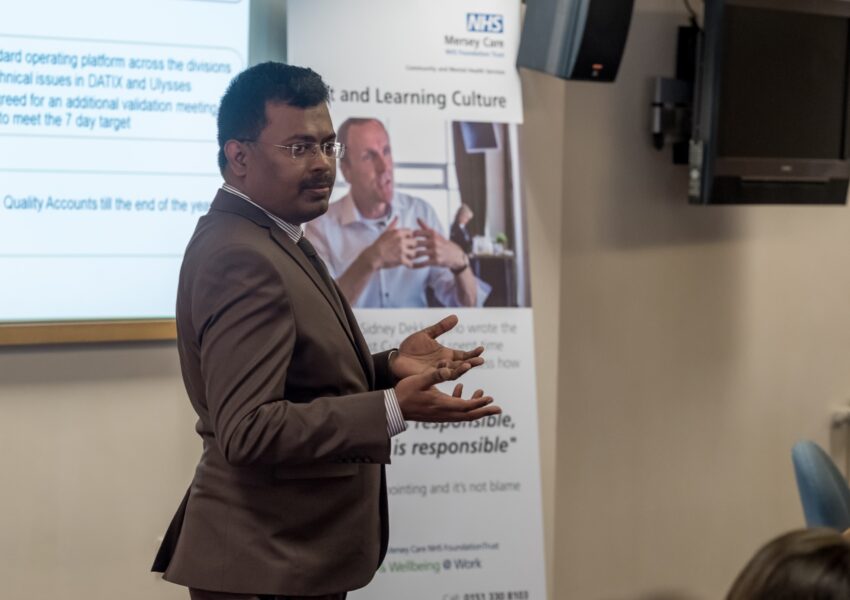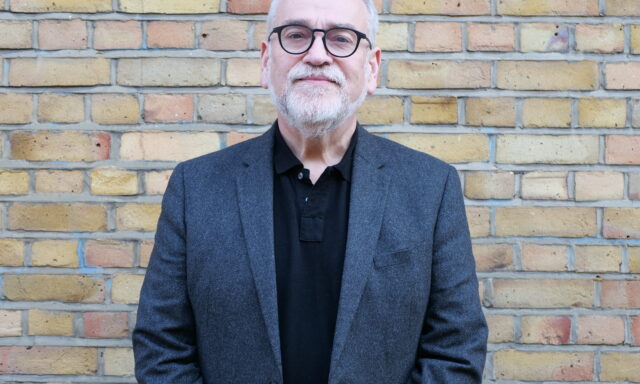Leading through uncertainty: Arun Chidambaram on change, culture and the future of mental health care
28 July 2025

As he prepares to take up the role of Chief Medical Director at Greater Manchester Mental Health, Arun Chidambaram reflected on the lessons of leadership, the progress made at Derbyshire Healthcare, and why visibility, trust and digital thinking will shape the future of care.
Arun Chidambaram knows what it means to lead during a time of complexity. When he became Medical Director at Derbyshire Healthcare NHS Foundation Trust nearly three years ago, he joined an organisation with a strong local identity and clear ambition. As part of a well-integrated system, Derbyshire Healthcare had strong foundations and a supportive leadership platform from which to evolve. But as with many NHS organisations, the years that followed brought challenges no-one could have predicted.
“There was a sense of calm on the surface,” he reflected. “But beneath that, the tsunami was building.” What followed was a period marked by the aftershocks of the pandemic, industrial action, rising demand and a growing complexity in the needs of patients. Yet within that context, Derbyshire Healthcare doubled down on what it could control: workforce, infrastructure, and creating the conditions for future excellence.
A platform for progress
Chidambaram is quick to acknowledge that pressures were shared across the NHS. But in Derbyshire, he said, the focus was on prioritising areas where meaningful, sustained improvement could be made. “You have to be honest about the context but focused on the levers you can actually pull,” he said. “And in Derbyshire Healthcare, we had a leadership group that was prepared to do just that.”
“We weren’t immune to national challenges, but we had a leadership group who were aligned on values and clear about what mattered. That gave us the ability to push forward, even during difficult periods.”
The Trust’s progress speaks for itself. Derbyshire Healthcare was named Digital Organisation of the Year at the 2025 HSJ Digital Awards, recognising its commitment to modernising care, empowering staff through technology and improving patient outcomes. The award was the result of years of focused effort, including building digital maturity from the ground up and ensuring frontline teams had a say in how tools were developed and deployed.
Its investment in digital infrastructure was matched by an ambitious estates programme, including the development of new buildings designed to support therapeutic environments and modern models of care. “We couldn’t deliver modern care in environments that weren’t built for today’s standards. That’s why the new build programme was so important. Both the purpose-built units and the work to bring existing wards up to spec. It’s about more than buildings. It’s about improving quality, safety and the patient experience.”
Derbyshire Healthcare’s new build programme represented a major step forward for the Trust — not just in improving the condition of its estate, but in enabling more complex, higher-acuity care to be delivered closer to home. Until recently, the Trust did not have its own Psychiatric Intensive Care Unit (PICU), meaning patients with the most complex needs were often sent out of area.
“We didn’t have all the parts of the pathway,” Chidambaram explained. “We weren’t used to managing the highest levels of acuity and complexity.”
The new development changes that. With the introduction of PICU capacity and the recruitment of staff with prior PICU experience, the Trust is now able to manage a much greater proportion of the patient pathway locally.
“This is a massive opportunity,” he said. “It means we can provide more complete, cutting-edge care, and reduce the need for patients to travel far from home.”
Chidambaram also emphasised the clinical and cultural shift this represented. “When you’ve not delivered certain kinds of care before you need to bring in expertise, train teams and give people confidence. That’s what we did.”
Alongside this, workforce remained a core priority. Through international recruitment and new clinical roles, the Trust strengthened medical staffing and improved retention. “It wasn’t just about filling gaps,” Chidambaram said. “It was about building stability and setting the Trust up for the future.”
Reflecting on his time at Derbyshire Healthcare, he added: “We had to adapt the good-to-great journey because of everything happening around us. But we never lost sight of the goal. We focused on what we could control, and now the platform is there to move forward with confidence.”
Shaping system understanding
Chidambaram’s leadership journey began in specialist learning disability services, and his career has taken in a wide spectrum of care settings and organisational cultures. A defining feature throughout has been his ability to navigate complexity and build shared understanding across disciplines.
“You can’t lead in mental health unless you’re willing to explain complexity. Repeatedly and patiently.”
In Derbyshire, this translated into work across medical governance, workforce development and digital transformation. But more than that, it meant spending time with teams, listening closely, and shaping decisions around what people on the ground were experiencing.
“Frontline staff often feel like the system moves around them. We had to ensure change felt grounded in reality, and achievable in practice. That’s what builds trust.”
He is a strong advocate for visibility in leadership, believing it is essential in environments where pressure is high, and resources stretched. “Compassionate leadership isn’t soft. It’s strategic. It’s about being present, understanding context, and making choices that support long-term resilience. That means being prepared to slow down in some areas so that others can move forward.”
The case for generalism
One area where Chidambaram sees a need for continued system reform is in the structure of crisis care. He believes that fragmentation and over-specialisation have created confusion for patients and operational inefficiencies.
“We’ve built so many specialist doors that patients in crisis no longer know which one to knock on. And often, those doors don’t connect. That leaves clinicians carrying risk and patients without the joined-up help they need.”
His vision is for a more integrated model of crisis support, centred around revitalised community mental health teams. “These teams should be the bedrock. But they’ve been under-prioritised. If we’re serious about making access easier and care more consistent, we need to invest in generalist capability and support clinicians to work across boundaries.”
He also believes this approach could help tackle variation in care and reduce inequalities. “In a generalist model, you reduce the number of handoffs, which means less room for people to fall through the gaps. And you create more space for relational care, which means people seeing the same team, building trust, feeling understood.”
Digital as enabler
Chidambaram’s time at Derbyshire Healthcare has further shaped his thinking on the potential of digital tools in mental health care. While pragmatic about their limits, he sees digitisation as a key enabler of sustainability.
“Digital is not the only solution. But it is one of the few ways we can meet rising demand with the workforce we have.”
He led efforts to digitise Mental Health Act processes, anticipating the additional requirements that will come with upcoming legislation. “We’re being asked to provide greater assurances around autonomy, capacity, rights, restrictions, all while facing a workforce deficit. Paper-based systems simply won’t cope.”
He also highlighted the role of data in improving decision-making. “When we can show where acuity is rising or referrals are increasing, we can use that intelligence to target resources more effectively.”
A local example illustrates the point. By analysing perinatal referral data, the Trust identified areas with lower service uptake and used the insight to improve outreach. “It was a simple use of data, but it helped us reach more people in the right way. We should be having those kinds of data-informed conversations with ICBs and collaboratives all the time.”
Looking ahead to Manchester
When Chidambaram joins Greater Manchester Mental Health NHS Foundation Trust in September, he will bring the full weight of these experiences with him. The Trust is navigating a period of scrutiny and change, and Chidambaram is clear-eyed about the task ahead.
“We have a responsibility to rebuild trust. With regulators, with the public, and with our own staff. That’s only possible if governance is strong and leadership is visible.”
His early priorities will focus on strengthening clinical governance and ensuring that leadership is visible and responsive. But he is also looking to the horizon, particularly around collaboration across the North West of England.
“We can’t keep working in isolation. Shared leadership across core mental health services is the only way we’ll address the workforce and resourcing challenges we all face. There is a real opportunity to align quality, safety and performance across systems, and that’s something I’m very motivated to support.”
Asked what success would look like after a year in post, he is reflective. “That we’ve made a start. That the culture is shifting. That we’re building a future based on safety, visibility and trust. And that the people we serve feel the difference. That’s the only measure that really matters.”


